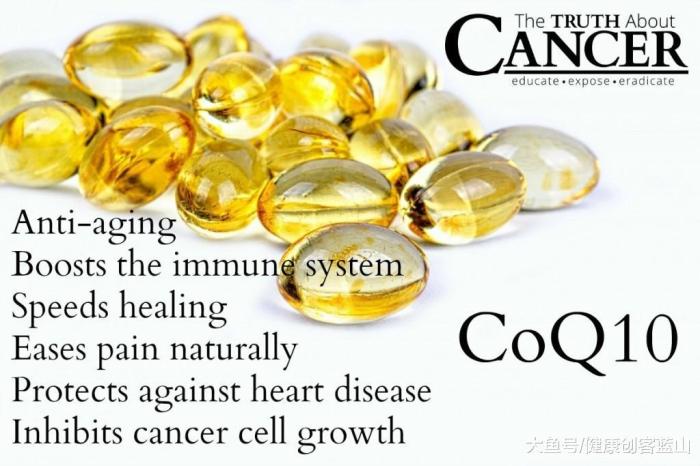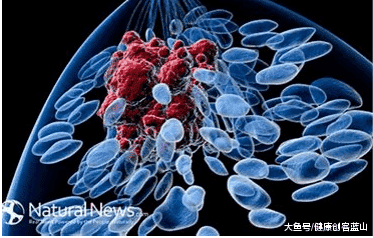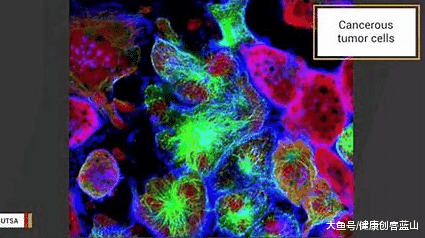辅酶Q10的抗癌机理 恢复癌细胞自杀的能力
How CoQ10 Kills Cancer?CoQ10 Restores Ability of Cancer Cell to Kill Itself
辅酶Q10:抗衰老、增强免疫、促进康复、止痛、保护心脏、抑制癌细胞生长
每一个接受治疗的乳腺癌患者都以杀死癌细胞为目标。癌细胞已经失去了杀死自己的能力,正在疯狂繁殖和扩散。如果在体内发现一种天然物质可以帮助细胞正常生长呢?
最近的一项研究表明,补充CoQ10可以恢复癌细胞杀死自己的能力。
背景:90年代的乳腺癌试验,服用CoQ10使 肿瘤缩小
在20世纪90年代,32名服用90毫克CoQ10的患者中有6名出现肿瘤体积缩小。其中一名患者随后服用了390毫克,两个月内乳房x线照片没有发现肿瘤。(1)另外3例常规治疗患者在3-5年内服用390 mg CoQ10。结果:1例患者肝转移消失。在病人2,一个肿瘤在胸膜腔消失。在病人3中,没有肿瘤病灶或转移的迹象。(2)
90年代的乳腺癌试验: 服用CoQ10使 肿瘤缩小
这些早期的研究暗示了CoQ10的使用是有科学依据的,现在已经发现了一种可能的作用机制。
作用机制:CoQ10可以恢复癌细胞自我杀伤的能力
在2006年4月的美国癌症研究协会(American Association for Cancer Research)上,迈阿密大学(University of Miami)的研究人员公布了他们的微阵列基因分析研究的结果,该研究尚未发表,表明CoQ10可以恢复细胞的自我杀灭能力。
上图:肿瘤细胞
CoQ10如何恢复癌细胞杀死自己的能力? bcl-2基因调节细胞分裂和程序性细胞死亡。细胞通常会分裂,不需要的或生病的细胞会被清除。但是,在癌症中,细胞死亡会减少。细胞不断分裂。在迈阿密大学的研究中,在患有黑色素瘤的老鼠被补充CoQ10 24小时后。研究发现,CoQ10可以显著下调(表达减少)bcl-2基因,使癌细胞自行死亡,从而抑制生长和扩散。(3)
研究人员解释了CoQ10的工作原理
“CoQ10和bcl-2既存在于正常细胞中,也存在于异常细胞中,但它们在恶性细胞中的比例发生了变化,”2006年4月,迈阿密大学皮肤科的透皮/皮肤癌症研究主任尼文·纳雷因(Niven Narain)在一次电话交谈中解释道。“虽然大多数癌症患者的bcl-2过表达,但包括乳腺癌患者在内的大多数癌症患者的CoQ10水平较低。”乳腺癌患者(4例)和黑色素瘤患者(5例)的血液中的CoQ10水平较低。低CoQ10与疾病晚期存在相关性(6)。
“当bcl-2过表达时,”Narain说,“细胞不能自我破坏,创造一个有利于细胞增殖和扩散的环境。”另外,癌症患者的CoQ10水平较低。补充CoQ10有助于恢复癌细胞自我杀伤的能力,因此乳腺癌患者应考虑癌症的后勤保障。”
寻求FDA批准的CoQ10
辅酶q10安全吗? 辅酶q减少肿瘤吗?
迈阿密大学CoQ10研究人员与Pathfinder Management, Inc.合作,寻求FDA批准CoQ10。FDA的批准需要一个概念的证明: CoQ10必须被认为是一种安全的分子,在削弱药物副作用和减少肿瘤方面有效。2006年4月,负责药物治疗的总工程师Indushekhar Persaud在一次电话交谈中说,为了帮助开展研究以获得FDA的批准,CoQ10的几个交付系统,包括透皮、静脉和空气净化系统,正在开发中。
乳腺癌患者可以考虑服用390毫克的CoQ10,这在Folkers和Lockwood乳腺癌患者的研究中得到了应用。因为CoQ10是脂溶性的,所以为了最大限度的吸收,建议在空腹时用油脂补充营养。
https://s.click.taobao.com/oChONNw 点击购买
How CoQ10 Kills Cancer?CoQ10 Restores Ability of Cancer Cell to Kill Itself
Every breast cancer patient undergoing treatment has as her objective the killing of her cancer cells. The cancer cells have lost their ability to kill themselves and are reproducing wildly and spreading. What if there is a natural substance found in the body that can help normalize cell growth?
A recent study suggests that supplementing with CoQ10, which is found in every cell of the body, can restore the ability of the cancer cell to kill itself.
Background: Some Tumor Reduction in '90's CoQ10- Breast Cancer Trials
In the 1990's, six of 32 patients who took 90 mg of CoQ10 showed partial tumor reduction. One of the six then took 390 mg, and within two months there was no mammographic evidence of the tumor. (1) An additional 3 patients undergoing conventional treatment took 390 mg of CoQ10 over 3-5 years. The results: In Patient One, liver metastases disappeared. In Patient Two, a tumor in the pleural cavity disappeared. In Patient Three, there was no sign of cancer in the tumor bed or metastases. (2)
These early studies hinted that there was a scientific basis for the use of CoQ10, and now a possible of mechanism of action has been discovered.
Mechanism of Action: CoQ10 Restores Ability of Cancer Cell to Kill Itself
At the April 2006 American Association for Cancer Research, University of Miami researchers presented the results of their microarray genes' analysis study, not yet published, suggesting that CoQ10 can restore the ability of the cell to kill itself.
How does CoQ10 restore the ability of the cancer cell to kill itself? The bcl-2 genes regulate cell division and programmed cell death. Cells normally divide, and unneeded or sick cells are eliminated. But, in cancer, there is a decrease in cell death. The cells keep dividing. In the U. of Miami study, after mice with melanoma were supplemented with CoQ10 for 24 hrs., CoQ10 was found to significantly down-regulate (decrease in expression) the bcl-2 genes, permitting the cancer cells to kill themselves, which inhibits growth and spread. (3)
Researcher Explains How CoQ10 Works
"CoQ10 and bcl-2 are both in normal cells and in abnormal cells, but the ratio changes in malignant cells," Niven Narain, the Director of Transdermal/Cutaneous Cancer Research in the Department of Dermatology at the University of Miami, explained in a telephone conversation in April 2006. "While most cancer patients have an over-expression of bcl-2, most cancer patients, including breast cancer patients, have low CoQ10." Blood levels of breast cancer patients (4) and melanoma patients (5) have been found to be low
in CoQ10, and there is a correlation between low CoQ10 and the advanced stage of the disease (6).
"When there is an over-expression of bcl-2," Narain said, "cells can't self-destruct, creating an environment favorable for cell proliferation and spread." Plus, the cancer patient has low levels of CoQ10. Supplementing with CoQ10 helps to restore the ability of the cancer cells to kill themselves Thus, breast cancer patients should consider the logistics of cancer. "
Seeking FDA Approval of CoQ10
Is CoQ10 safe? Does CoQ10 reduce tumors?
The U. of Miami CoQ10 researchers have partnered with Pathfinder Management, Inc. to seek FDA approval of CoQ10. FDA approval requires a Proof of Concept: CoQ10 must be deemed to be a safe molecule and effective in weakening drugs' side effects and in tumor reduction. To help conduct studies to gain FDA approval, Indushekhar Persaud, the Chief Engineer for Drug Therapy, said in an April 2006 telephone conversation that several CoQ10 delivery systems, including transdermal, IV, and aerosals, are under development.
Breast cancer patients may consider taking 390 mg of CoQ10, which was used in the Folkers and Lockwood studies on breast cancer patients. Since CoQ10 is fat-soluble, taking the nutrient with an oil on an empty stomach is recommended in order to maximize absorption.
References
1. Lockwood K et al., Partial and Complete Regression of Breast Cancer in Relation to Dosage of CoQ10, Biochem Biophys
Res Commun 1994.
2. Lockwood K et al., Progress on Therapy of Breast Cancer with Vitamin Q10 and the Regression of Metastases, Biochem
Biophys Res Commun 1995.
3. Narain N et al., Coenzyme Q10: A Novel Bcl-2 Drug Target for the Treatment of Melanoma. Abstract 791, AACR
Conference 2006.
4. Joliet P et al., Plasma Coenzyme Q10 Concentrations in Breast Cancer: Prognosis and Therapeutic Consequences,
Int J Clin Pharmacol 1998.
5. Rusciani L et al., Low Plasma Coenzyme Q10 are an Independent Prognostic
Factor for Melanoma Progression and are Correlated with the Advanced Stages
of Cancer, Am Acad Dermatol 2006.
6. Joliet P et al., Plasma Coenzyme Q10 Concentrations in Breast Cancer;
Prognosis and Therapeutic Consequences, Int J Clin Pharmacol 1998.
7. Conklin K., Coenzyme Q10 for Prevention of Anthracycline-Induced Cardiotoxicity,
Integrative Cancer 2005
Breast Cancer Choices - CoQ10 http://www.breastcancerchoices.org/coq10.html



.png)